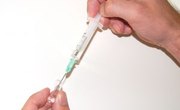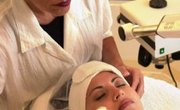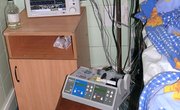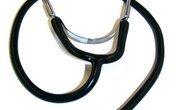Certified hyperbaric registered nurses provide patient care and management in facilities using hyperbaric technology. Developed in the 1950s, hyperbaric oxygen therapy treats decompression sickness as well as a variety of other illnesses and injuries. Performed in pressurized chambers and rooms, hyperbaric oxygen therapy requires nurses to have enhanced technical and medical expertise beyond their regular nursing licensure requirements.
Education
A certified hyperbaric nursing candidate must first meet the licensure requirements of a registered nurse in their state. Registered nurses typically hold a bachelor of science degree in nursing, an associate degree in nursing or a diploma in nursing, depending on state licensing standards. Nursing programs require both classroom and clinical experiences. In addition to core liberal arts courses, nursing program courses include anatomy, physiology, microbiology, chemistry, nutrition, psychology and other social, physical and behavioral science courses. Clinical experiences help nurses hone their technical skills and abilities in various hospital departments such as emergency, psychiatric, or long-term care. Higher-level degrees, such as the bachelor of science in nursing, will require courses with greater concentration in leadership and critical thinking to account for greater responsibility and administrative positions.
Training
The National Board of Diving & Hyperbaric Medical Technology (NBDHMT) accredits, maintains and administers courses and exams for hyperbaric nursing certification. Before taking the exam, a registered nurse must complete a 40-hour introductory hyperbaric medicine course. This course introduces already practicing medical professionals to the history and physics of hyperbaric technology in addition to procedures and protocols, assessment, safety and management responsibilities related to hyperbaric procedures. After completing the introductory course, registered nurses must gain at least 480 hours of experience in the area of hyperbaric medicine before taking the certification exam.
Qualifications
Certification is a way of qualifying specialized knowledge and experience in hyperbaric technology. According to the NBDHMT, certification requires completing appropriate hyperbaric medicine training and life-support training, achieving minimum experience requirements, gathering written recommendations and validation of hyperbaric experience by your employer and passing the certification exam. After achieving certification, the certified hyperbaric nurse must recertify every four years. Recertification requirements include completing at least 40 hours of continuing education over four years and at least 480 hours of clinical time each year.
Considerations
According to the U.S. Bureau of Labor Statistics, the nursing profession was expected to grow 26 percent between 2010 and 2020 -- which is faster than the 14 percent average for all occupations -- as technology changes and populations live longer. As a result of technology and medical advances, state and national training and licensing requirements change frequently. Nurses can contact university advisers and professional certification boards as resources to keep updated on certification requirements. Some employers offer subsidized training as a job benefit.
Related Articles
References
Writer Bio
Amanda Schroeder holds a BS in Hospitality Management from Keuka College and a MSed in Vocational Education from SUNY Oswego. She has experience in restaurant management and is educated in school district business administration. Schroeder is currently teaching business and family and consumer science in New York State.











